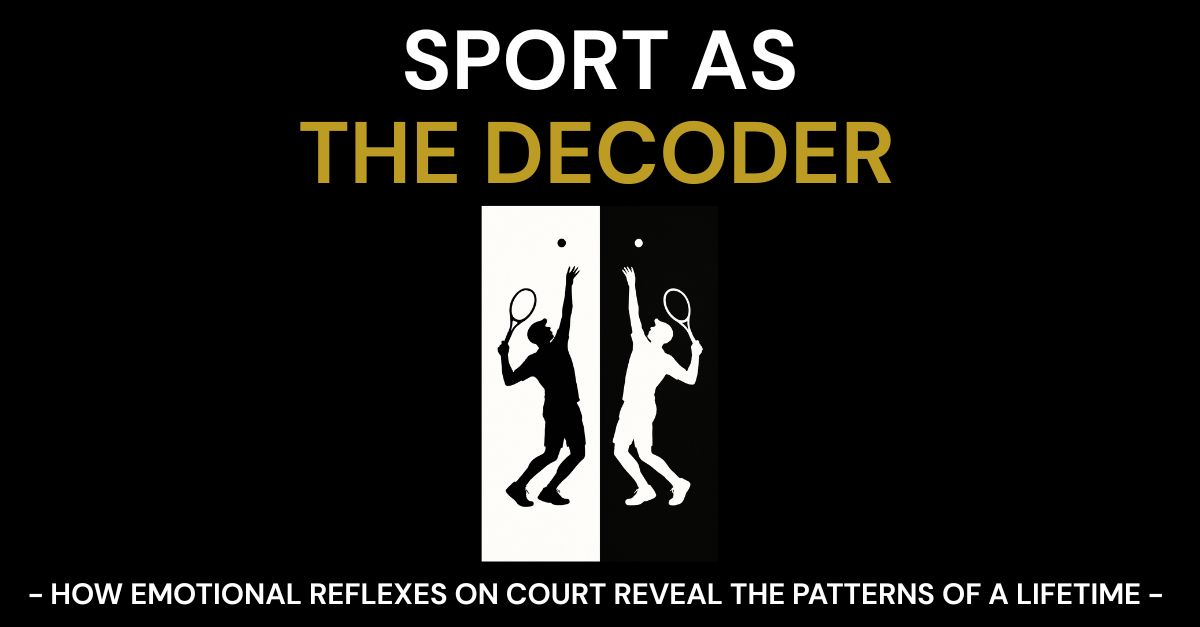
Sport as the Decoder: How Emotional Reflexes on Court Reveal the Patterns of a Lifetime

Why I Stopped Seeing Technique
I’ve spent enough hours at the side of a tennis court to know when something deeper is playing out. The shot selection doesn’t make sense. The tension in their body arrived before the mistake. The match became personal – and no one said a word. You can call it performance. You can call it pressure. But I’ve learned to call it something else: a reflex.
Because most of the time, what I’m watching isn’t about tennis at all. It’s about emotion – unprocessed, unspoken, unconscious. It’s about how that player protects, pushes, proves, or disappears. And the more I watched, the clearer it became:
These weren’t just match-day behaviours. They were the same emotional reflexes shaping how that player lived the rest of their life.
How they handled feedback. How they shut down when visible. How they pushed through pain. How they tried to earn their own worth – one win at a time. Tennis had become the stage. But what I was really reading was the script underneath. And once I saw it, I couldn’t ignore it.
When Sport Becomes a Mirror
At first, I thought I was just decoding performance. Trying to understand why the forehand broke down at 4-all.
Why the confident junior became tight and hesitant when the match got close. Why so many players trained with ease… and then unravelled the moment it counted.
But the more I watched, the more I realised: this wasn’t about skill. This was about pattern.
The same emotional reflexes kept showing up – not just on match day, but in conversation. In their training rhythm. In how they walked off court.
In how they carried disappointment. In what they said when no one else was listening. I saw players push through injury, not out of grit – but because rest felt like failure.
I saw players disconnect the moment their parent arrived.
I saw athletes who couldn’t receive praise without deflecting it – because deep down, they didn’t believe they were worthy of it.
That’s when the shift happened.
Tennis stopped being a sport. It became a mirror.
Because the way they played under pressure… was the same way they lived.
The match was just the most concentrated version of their emotional system. A compressed version of what their life might become – a suite of emotional patterns showing up again and again in relationships, careers, and quietly sealing the foundation of their self-worth.
And suddenly, I wasn’t just decoding tennis anymore. I was watching life – playing out in real time. Only now, I had a language for it.
What We Can Actually Map
That’s what sport does when you know how to look. It doesn’t just test technique. It reveals patterns.
It gives you the rare opportunity to see how someone runs – before those patterns start embedding into personality.
Before the reflex becomes the rule.
And tennis does this faster than most. Because in tennis, there’s nowhere to hide. No teammates. No sideline coach. No time to pause and regulate. It’s just you, your breath, your emotion – and every part of you that responds when the plan unravels. It’s a living, breathing mirror.
And for the players willing to look into it, sport becomes more than performance. It becomes translation. Tennis becomes a decoder.
Because when a player sees how they respond to pressure… they’re not just learning how to play.
They’re learning how they move through life.
And here’s where it changed everything for me: I realised we could map it. That what looked like “match behaviour” was actually emotional coding – reflexes that had names, shapes, symptoms, and costs. Patterns that could be traced… and rewritten.
There were seven of them. And every single one tells a story.
The 7 Emotional Reflexes
1. Identity Lock
Performance = proof of worth
On Court: Playing to prove something. Fear of failure feels like fear of being nothing. Winning is the only way to feel safe or seen.
In Life: Over-achieving. Perfectionism. Building your identity around external validation – grades, salary, feedback, social approval. Constantly measuring your value through doing. Success feels temporary; failure feels personal.
Scenario: You achieve something everyone else celebrates – but all you feel is relief… because you’ve held off the fear of not being enough for one more day.
Line: When your worth is always on the line, even winning can feel like survival.
2. Override Mode
Push through everything – don’t feel, just do
On Court: Plays through pain, fatigue, or emotional collapse – not to prove something, but because stopping feels more dangerous than pushing. Often praised for “grit,” even while burning out.
In Life: Over-scheduled. Over-responsible. Keeps going long after the signals say stop. Rest feels unsafe. Emotionally disconnected until the crash forces reflection.
Scenario: You wake up exhausted, but power through another day – because the fear of falling behind is louder than your body’s call to slow down.
Line: Override is clever – until the body says no in a language you can’t ignore.
3. Emotional Overload Spiral
Feel too much, too fast – and can’t contain it
On Court: Emotions flood the system – panic, crying, shutdown. Reacts intensely to line calls, missed shots, small shifts. Every moment feels heavy with meaning.
In Life: Carries the weight of everything. Absorbs tone, words, energy. Small feedback feels like personal attack. Regulates through withdrawal or outbursts.
Scenario: One email sends you spiralling. You rehearse the response in your head 15 times, even though it was only two lines long.
Line: You’re not fragile – you’re flooded. And no one ever taught you how to drain it gently.
4. Armour Reflex
Don’t show anything. Stay in control.
On Court: Unreadable. No visible emotion, win or lose. Disconnects from feeling to stay “in control.” Often misunderstood as aloof or disengaged.
In Life: Holds the world at a distance. Can be high-functioning but emotionally unavailable. Finds it safer to seem strong than to risk being seen.
Scenario: You haven’t cried in years. You say “I’m fine” before anyone even asks. You wouldn’t know how to explain the feeling even if you tried.
Line: Armour protects, but it also isolates. What defends you can also bury you.
5. Sensory Vulnerability
The watchers change everything
On Court: Plays differently when the coach or parent is there. Feels exposed, judged, frozen under visibility.
In Life: Absorbs the energy of the room. Over-sensitive to tone, mood, and facial expressions. Takes feedback personally, even when it’s not meant that way.
Scenario: You walk into a room and instantly feel the tension – and somehow take it on like it’s yours.
Line: When your system is always scanning the room, it forgets how to stay with you.
6. Inherited Patterning
Running someone else’s emotional script
On Court: Playing the way they were told. Echoing a parent, coach, or system – even when it doesn’t feel true.
In Life: Running inherited beliefs around money, success, parenting, and approval – often without realising they’re not yours. Living by old rules, silently seeking permission.
Scenario: You raise your kids the way your parents raised you – even though it didn’t feel good – because questioning it feels disloyal.
Line: You didn’t choose this pattern. But you’re still living it.
7. Story-Based Coping
Explaining instead of experiencing
On Court: Constant internal dialogue. Blaming conditions, intellectualising mistakes, playing cautiously within a self-made narrative. Pre-writing the story of how the match will end – before it does.
In Life: Overthinking everything. Losing access to free expression. Trapped in the narrative of why you are this way, or why it can’t change. Justifying pain instead of moving through it. Living inside the story of who you think you should be – or who someone else needed you to be.
Scenario: You build the narrative around a relationship, a job, or a moment – before it’s even unfolded – and then shrink yourself to survive the ending you wrote.
Line: You can’t free yourself while clinging to the story that explains your cage.
What Changes When We See It Early
Most people only reflect once the pattern has cost them something. The job. The injury. The relationship. The identity collapse.
But sport gives us a rare chance to see it before it crystallises.
Before the reflex becomes the rule.
Before the nervous system writes a story the player doesn’t know they’re living. That’s what this work has become. Not just decoding how a player performs – but how a person runs.
And once you see the pattern, you don’t have to keep repeating it.
You can pause. You can choose. You can rewrite.
Because no reflex is permanent. And no outcome – not even the scoreboard – can ever define the whole story.
That’s what tennis offers when we’re willing to look beyond the result. A living, honest mirror.
And sometimes – a way home.
